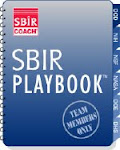.
All right folks, it's time to get serious. We got our continuing resolution, but with only four months of breathing room, we have to move fast. Like all revenue related legislation, SBIR Reauthorization must originate in the House of Representatives. And the bill will be introduced via the House Small Business Committee. That means dealing with Chairwoman Nydia Velazquez (D-NY).
So, we're mobilizing a letter and phone campaign. The ultimate goal is to persuade Chairwoman Velazquez, via peer pressure, to not change the SBIR eligibilty rules. It's mobilizing the peer pressure that's the object of the current campaign.
For those of you not familiar with all of this, the current rules limit SBIR eligibility to small businesses that are "at least 51 percent owned and controlled by one or more individuals". This precludes participation by companies that are majority owned by Venture Capital firms. In the past, Chairwoman Velazquez has adamantly promoted a change in the rules for SBIR eligibility that would allow unlimited participation by VC controlled small businesses. For the most part, it was that issue that derailed reauthorization last year. This won't be easy.
We have the support of some very good allies for this effort. A "Dear Colleague" letter signed by Representatives Edward Markey (D-MA), Niki Tsongas (D-MA), Peter Welch (D-VT), and Paul Hodes (D-NH) was sent recently to all of their fellow Members of the House of Representatives. The letter urges them to join in co-signing a letter to Chairwoman Velazquez, which will, in turn, urge her to "support preservation of the SBIR eligibility requirements in the current statute".
Our leader, Jere Glover, Executive Director of the Small Business Technology Council (SBTC), has just released a Legislative Action Plan for small business advocists everywhere to contact their House Representative and urge him or her to join in co-signing the letter to Chairwoman Velazquez.
The SBTC will be hosting a National Conference Call on Tuesday, March 31st, at 11AM EDT to discuss this peer-pressure strategy and how we can help build the pressure. The call-in number is 616-712-8000 (code 727524#). Please join us. And, please also consider joining the SBTC. All this work costs them money!
We really have to get this done THIS WEEK. Jere says that the deadline for getting signatories is April 10th, but Congress officially begins their two-week Easter Recess on Monday the 6th, so for all practical purposes, do what it takes to get the word to your home and office congressional district's Representative by Friday, April 3rd.
This is only the first step in this battle. We'll need to stay vigilant and be ready to debate with facts and strength of numbers in order to get a Reauthorization Bill that will truly improve the SBIR Program. I'll do my best to keep you informed. I've even created a special URL to take you quickly to my SBIR Coach wesbsite's SBIR Reauthorization section: www.SBIRreauthorization.com.
So, for the full story on what's going on, including a recitiation of the issues, the most up-to-date version of the SBTC's Legislative Action Plan, current lobbying and advocacy activities, copies of all the letters mentioned above, template letters to tailor and send, contact information for legislators, links to other sources of information, and some personal recommendations from The Coach, monitor www.SBIRreauthorization.com.
.
Twenty Years of Small Biz Survival
1 week ago









